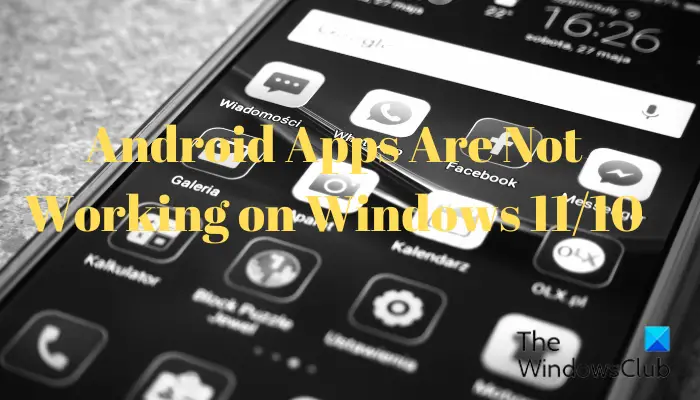Why are my Android apps not working on Windows 11/10?
If Android apps not working on your Windows 11/10 computer it could be due to a number of factors, such as an outdated Windows Subsystem for Android, an app compatibility issue, the presence of malware, or a software bug. However, using the solutions discussed in this article, you should be able to fix the problem. Recent complaints about Android apps not working on Windows 11/10 have come from Windows users who run the Windows Subsystem for Android. Some people’s Android apps launch but regularly crash. These issues could result from the program’s complexity, but the main causes are compatibility issues, incorrect settings, and software bugs. In this article, we will go through different methods that can be used to fix this issue on Windows 11/10.
Fix Android apps not working on Windows 11/10
Android apps may crash or stop functioning completely when you use the Windows Subsystem for Android to run them on your Windows 11 or Windows 10 PC. If that’s the case, these are the perfect solutions:
1] Restart Your Computer
Although it may sound cliche, this is one of the best methods to dealing with problems like these. If there is a simple malfunction brought on by the processes running on your computer, restarting your computer just gives it a new start and can therefore help in resolving this Android app not working on Windows. So we recommend you restart your computer and try launching Android apps on it again. But if the issue persists, you should try the subsequent solutions.
2] Restart the Windows Subsystem for Android
The ability to run Android apps on your computer natively is made possible with the help of Windows Subsystem for Android, and this issue you are facing may result from a glitch with the program. For this reason, you should restart the Windows Subsystem for Android by following the steps below and see if it will help:
Press Windows + S to open the Windows Search, type Windows Subsystem for Android, and open the Best match result.On the resulting window, navigate to Turn off Windows Subsystem for Android in the Windows Subsystem for Android section and select Turn off.Launch an Android app on your PC to reopen the Windows Subsystem for Android software.After WSA opens, you can now try to launch other apps and see if they are working properly.
3] Update Windows Subsystem for Android
Using an outdated program that may have had its issue patched is another source of software issues. Also, given that Windows Subsystem for Android is a relatively new application, there might occasionally be some glitches. However, if you update the software frequently, you might avoid problems like this. Here is how to update Windows Subsystem for Android:
Open Microsoft Store through your taskbar and click on Library when the app launches.On the Microsoft Store Library, you will see apps that need to be updated; simply click on Update in front of Windows Subsystem for Android and allow the installation to finish.
You can then restart your computer and try running an Android app.
4] Uninstall and Reinstall Windows Subsystem for Android
Another best method to resolve this issue is to uninstall and reinstall the Windows Subsystem for Android by following the steps below:
Press Windows + R to open the Run Command Box.Now, type the control panel into the run box and press Enter.This command will open the Control Panel; click on Programs and Features on the Control Panel window.Navigate to Windows Subsystem for Android, right-click it and select Uninstall.Select Yes in the next window to confirm the operation.
After uninstalling the app, visit this link to install it back.
5] Set Windows Subsystem Resource Settings to Continuous
This is another recommended solution to fix this Android apps not working on Windows 11/10 issue, so you should try it if the previous solutions didn’t fix the issue:
Press Windows + S, type Windows Subsystem for Android and open the Best match result.After WSA launches, navigate to the System section.Look for the Subsystem resources option, click on the menu in front of it and set it to Continuous.
After doing this, you should restart your computer and try running Android apps when it boots up. Read: Unable to start Windows Subsystem for Android on Windows 11
6] Make Sure Control Flow Guard is Turned on
The Control Flow Guard is another important app that needs to be enabled for the proper functioning of Windows Subsystem for Android. Hence, if you have not enabled the function, follow the steps below to do so:
Press Windows + I to open the Windows Settings.Click on Privacy & security and select Windows Security.Tap on Apps & browser control and select Exploit protection settings on the resulting page.Now, set the menu under Control flow guard to Use default (On).
7] Uninstall and Reinstall the Application that is Not Working
The Android app you are attempting to run on your Windows PC may be the cause of the issue, but some users have found that simply uninstalling and reinstalling the app may resolve the problem. Therefore, we recommend you try doing it as well.
8] Update Windows
For those using an outdated version of Windows and experiencing this issue, it is necessary to mention that updating Windows is another solution that can help you.
Press the Windows + I keys to open Settings on your computer.Then click on Update & Security.On the Windows Update page, you’ll see if there are any available updates. If there are, follow the prompts to install them.
Read:
BlueStacks lets you run Android Apps and Games on your Windows PCWindows Subsystem for Android vs BlueStacks, Which is better?
Does Windows 11 support Android apps?

